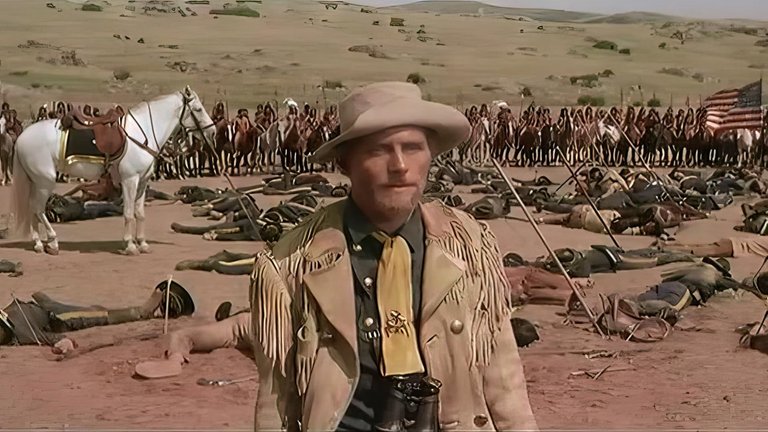Film Review: Custer of the West (1967)

The shifting lens through which Hollywood has portrayed George Armstrong Custer—a figure as flamboyant as he is contentious—offers a revealing snapshot of evolving attitudes toward Wild West mythology. In the golden age of Classic Hollywood, Custer was immortalised as a romantic martyr, his doomed heroism epitomised by Errol Flynn’s dashing turn in They Died With Their Boots On (1941). By the New Hollywood era, revisionist fervour recast him as a genocidal maniac, most memorably in Arthur Penn’s Little Big Man (1970). Straddling these extremes is Robert Siodmak’s Custer of the West (1967), an ambitious but uneven epic that attempts to go through the murky waters between hagiography and condemnation. While the film’s aspirations to complexity are commendable, its execution falters under the weight of technical indulgence, miscasting, and a tonal identity crisis.
The film opens in 1861, charting Custer’s Civil War exploits as a brash Union cavalry officer whose tactical audacity earns him renown. With the Confederacy’s defeat, however, Custer (Robert Shaw) finds himself adrift—a warrior without a war. His superior, General Phil Sheridan (Lawrence Tierney), offers him a grim new purpose: suppressing Native American resistance in the Dakota Territory to clear the path for white expansion. Custer accepts, relocating with his wife Libby (Mary Ure) to command the 7th Cavalry Regiment. Initial successes against Cheyenne war parties, led by the formidable Dull Knife (Kieron Williams), soon unravel as Indigenous nations, betrayed by broken treaties, retaliate violently. Public backlash against Custer’s failures to prevent massacres nearly costs him his command, until a rousing speech before Congress—a blend of charisma and jingoism—rehabilitates his image. The film culminates in his ill-fated 1876 campaign, ending in the carnage of Little Bighorn.
Produced by Philip Yordan—a figure synonymous with 1960s European co-productions and a reputed front for blacklisted writers—Custer of the West bears the hallmarks of his lavish, ideologically fraught epics. Shot in Spain with a sprawling budget, the film aspires to the sweeping grandeur of Lawrence of Arabia (1962), positioning Custer as another complex historical agent dealing with imperial hubris. Yet director Robert Siodmak, though a seasoned craftsman of noir classics like The Killers (1946), lacks David Lean’s knack for balancing intimacy with spectacle. His set pieces, while occasionally striking, feel disjointed, more concerned with scale than emotional resonance. The decision to film in Cinerama—a widescreen format prized for visceral immersion—exacerbates these issues. Though intended to amplify the film’s epic scope, its use here feels gimmicky: chaotic sequences of rapid motion disrupt narrative cohesion, stretching the runtime without deepening thematic impact. The technology, ideal for kinetic action, becomes a liability in quieter moments, rendering dialogue scenes sterile and stagey.
The screenplay, written by blacklist survivors Bernard Gordon and Julian Zimet, gestures toward revisionism by acknowledging the genocidal underpinnings of westward expansion. Custer is no noble warrior; Sheridan bluntly informs him their mission is a land grab. Shaw’s Custer approaches this task with chilling pragmatism, displaying neither malice nor empathy—until a jarring third-act vision of an armoured train (a clunky metaphor for industrialised warfare) sparks a belated epiphany. This moment, intended to symbolise the obsolescence of both cavalrymen and Native resistance, feels unearned, undercut by the film’s prior refusal to engage meaningfully with Indigenous perspectives. While Dull Knife’s defiance is portrayed with fleeting dignity, most Native characters remain faceless adversaries, their grievances overshadowed by Custer’s existential angst.
The film’s most glaring flaw lies in its casting. Robert Shaw, though magnetic in roles like Quint in Jaws (1975), is fatally miscast as Custer. His performance—stoic to the point of catatonia—drains the character of the fiery volatility that defined the historical figure. Shaw’s real life wife Mary Ure’s similarly inert, playing Libby as a cipher whose devotion to her husband lacks emotional depth. Ty Hardin and Jeffrey Hunter, as Major Reno and Captain Benteen, fare little better, their roles reduced to alcoholic disillusionment and token moral conflict, respectively. Only Lawrence Tierney’s Sheridan transcends the mediocrity, his gruff authority embodying the era’s ruthless realpolitik. Robert Ryan, meanwhile, is squandered in a superfluous subplot as a gold-obsessed deserter—a narrative dead end that epitomises the film’s uneven pacing.
Spain’s arid landscapes, standing in for the American frontier, provide a visually striking backdrop, and Siodmak orchestrates the climactic Battle of Little Bighorn with harrowing intensity. Yet these merits are undermined by the film’s disjointed structure and ponderous pacing. What salvages Custer of the West from outright mediocrity is Bernardo Segall’s haunting score, a masterclass in melancholic grandeur. Its elegiac motifs lend the film a pathos its script and performances often fail to evoke.
Custer of the West remains a fascinating curio, emblematic of a transitional moment in Western cinema. Its attempts to deconstruct the Custer myth are undercut by technical indulgences, miscasting, and a reluctance to fully grapple with the genocide it depicts. Yet within its flaws lies a kernel of ambition—a desire to confront the ambiguities of history rather than succumb to simplistic mythmaking. For all its shortcomings, the film’s very existence speaks to a broader cultural shift, a growing unease with the triumphalist narratives of old. As such, it deserves recognition, if not as a masterpiece, then as a flawed but earnest bridge between the genre’s past and its revisionist future.
RATING: 5/10 (++)
Blog in Croatian https://draxblog.com
Blog in English https://draxreview.wordpress.com/
InLeo blog https://inleo.io/@drax.leo
Hiveonboard: https://hiveonboard.com?ref=drax
InLeo: https://inleo.io/signup?referral=drax.leo
Rising Star game: https://www.risingstargame.com?referrer=drax
1Inch: https://1inch.exchange/#/r/0x83823d8CCB74F828148258BB4457642124b1328e
BTC donations: 1EWxiMiP6iiG9rger3NuUSd6HByaxQWafG
ETH donations: 0xB305F144323b99e6f8b1d66f5D7DE78B498C32A7
BCH donations: qpvxw0jax79lhmvlgcldkzpqanf03r9cjv8y6gtmk9